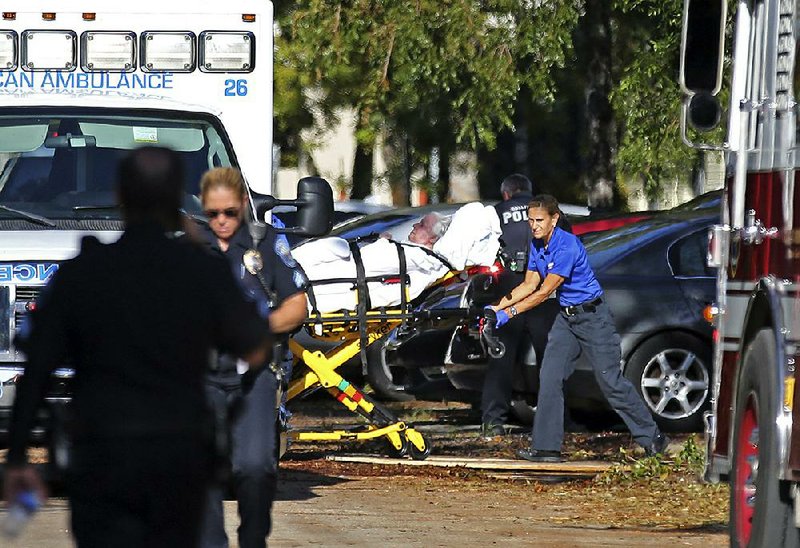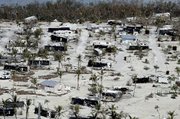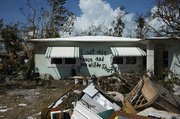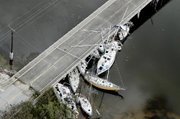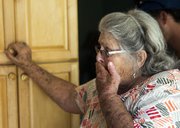The death toll left behind by Hurricane Irma continued to rise Wednesday with the loss of eight lives at a South Florida nursing home that apparently was without air conditioning during ongoing power failures statewide, area officials said.
The nursing home, the Rehabilitation Center at Hollywood Hills in the city of Hollywood, had electricity but the transformer that relays power to the air conditioning had sustained a "prolonged power failure," the administrator said in a statement provided to NBC 6, a local television station.
Four of the nursing home patients died at the facility and four others were pronounced dead after being taken to a hospital, authorities said Wednesday afternoon. More than 100 other people were evacuated from the facility, they said, including some who were taken to nearby hospitals.
Hollywood Police Chief Tom Sanchez said investigators believe that the deaths at the nursing home were heat-related.
Click here for larger versions
Photos by The Associated Press
Photos by The Associated Press
"The building has been sealed off, and we are conducting a criminal investigation," he said.
Gov. Rick Scott called on Florida emergency workers to immediately check on all nursing homes to make sure patients are safe, and he vowed to punish anyone found culpable in the deaths.
"This situation is unfathomable," he said.
The five women and three men ranged in age from 70 to 99.
Exactly how the deaths happened was under investigation. Sanchez said authorities have not ruled anything out, including carbon-monoxide poisoning from generators. He also said investigators will look into how many windows were open.
The rehabilitation center is across the street from Memorial Regional Hospital, the flagship facility of the Memorial Healthcare System and one of the largest hospitals in the state. An official from Memorial said the health care network was helping to evacuate people from the rehabilitation center, which is not part of the Memorial system, and that it would take some to other system hospitals in the region.
The facility's administrator did not return messages left by The Washington Post.
Witness accounts suggested that the heat had caused problems inside the nursing home at least since Tuesday afternoon. When Eli Pina went to visit her mother, Mirelle Pina, 96, at noon Tuesday, it was sweltering inside, she said.
Eli Pina said she was shocked and that she urged the staff to make sure all the patients were OK. "It felt like 110 degrees," she said.
Alarmed at the conditions, Pina said, she called the power company, Florida Power & Light, four times to report the problem. She was told that help was on the way, but no one arrived.
She heard the news on the television Wednesday morning and drove straight over, she said. When she found out her mother was fine, she was relieved, she said.
"This was an emergency, a life-threatening situation," she said. "The facility should have transferred people yesterday."
Rob Gould, a spokesman for Florida Power & Light, said at a news conference Wednesday that the company met in March with Broward County officials to discuss hurricane preparations but that the officials had not flagged the facilities evacuated Wednesday as "top-tier" critical infrastructure that would need power first. Memorial Regional Hospital was one of those top-tier facilities.
"They identified which facilities were to be critical, top infrastructure facilities," Gould said of county officials. "This was not one of them, unlike Memorial Hospital across the street, which is in service."
Flora Mitchell, 61, of Dania Beach, Fla., said her sister, Vonda Wilson, 58, has lived at the Hollywood nursing home since suffering a stroke 10 years ago.
Mitchell, who went to the home after hearing of the deaths on the news, said she did not know whether her sister, who cannot walk or talk but can hear, was OK. "It's terrible, with no news about her," she said.
HEAT PERIL
Millions of people across Florida have lost power since Irma began lashing the state, and utilities have warned that some of the failures could extend for days or even weeks.
This has cut off air conditioning for scores of Floridians, and the state's heat adds a perilous element to the ongoing power failures.
Scott Sheridan, a climatology professor who studies heat illness at Kent State University, said the people at particular risk are those who are used to being in a climate-controlled environment -- like a nursing home or another health facility -- and are suddenly thrown into saunalike conditions. As a body ages, its "thermo-regulatory system" becomes less efficient, and it becomes less capable of cooling.
.
"To be suddenly out of that [air conditioning] -- even if temperatures don't sound record-breaking -- it may be an environment these people are not accustomed to at all," Sheridan said.
About 1 in 5 Florida residents is age 65 or older.
In Hollywood, temperatures are forecast to reach the 90s this week.
"As with millions of other Floridians, our centers are coping with the loss of power and infrastructure in the communities that were most affected by the devastation," the Florida Health Care Association said in a statement Wednesday. "Approximately 150 facilities out of the nearly 700 facilities in the state do not currently have full power services restored."
Earlier in the week, a dangerous scene played out inside an assisted-care facility for patients with dementia and memory impairment in Cape Coral, Fla., on the state's Gulf Coast. For three days, the facility lacked power, and elderly patients suffered in the rising temperatures.
Humidity made the hard-surfaced floors slick with condensation, and patients gathered in a small day room to catch a slight breeze from screened windows. A handful of small fans powered by a borrowed generator were all that kept the situation from devolving into a medical emergency, said Dan Nelson, Cape Coral Shores' chief operating officer.
A state official eventually said a generator and gas were eventually found, but they were not needed; the power came back on.
The eight people who died Wednesday in South Florida were part of a death toll that, while relatively low compared with other major storms, has slowly climbed in recent days.
Not counting the nursing home deaths, at least 17 people in Florida have died under Irma-related circumstances, and six more in South Carolina and Georgia, many of them well after the storm had passed. The death toll across the Caribbean stood at 38.
At least six people died of apparent carbon-monoxide poisoning from generators in Florida. A Tampa man died after the chain saw he was using to remove trees recoiled and cut his carotid artery.
The toll included two people in Georgia who died when trees fell on them and a man in Winter Park, Fla., near Orlando, apparently electrocuted by a downed power line in a roadway.
Officials were investigating a number of deaths believed to be related to the storm, though it was not clear whether Irma was directly responsible in every case.
Even as Irma dissipated and moved inland, another danger emerged for those without power: generators. Authorities have warned that those devices can be deadly, noting they can easily sicken or kill people inside homes.
The Daytona Beach Fire Department in Florida said Wednesday morning that one person had died and three others were taken to a hospital for carbon-monoxide poisoning from a generator inside a home there, and the department pleaded with people to keep their generators outside.
Across Florida and the American southeast, people have grappled with the aftermath of Irma, which slammed into the Sunshine State over the weekend and tore apart trees and buildings with slashing winds and pounding rain. Jacksonville, a city on the state's northeast coast, was deluged with historic flooding.
More than 6 million people were evacuated from their homes in Florida, and they have slowly begun to return, even as roadways remain littered with debris, homes lack electricity and traffic signals have gone dark.
Across the state, the explanations for the power failures were visible alongside the road.
"It's a lot of trees and power lines and snapped poles," said Kate Albers, a spokesman for Collier County, which stretches across southwestern Florida and includes Marco Island, where Irma made her second landfall.
"I can tell you from driving around you see lines down all over the place," Albers said. "You see trees thrown through power lines and you'll see an occasional pole."
Information for this article was contributed by Mark Berman of The Washington Post; by Tim Reynolds, Terry Spencer, Jason Dearen, Brendan Farrington, Gary Fineout, Joe Reedy, Jay Reeves, Terrance Harris, Claire Galofaro, Jennifer Kay, Freida Frisaro, Curt Anderson, David Fische and Angela Fritz of The Associated Press; and by Neil Reisner and Amy Harmon of The New York Times.
A Section on 09/14/2017
